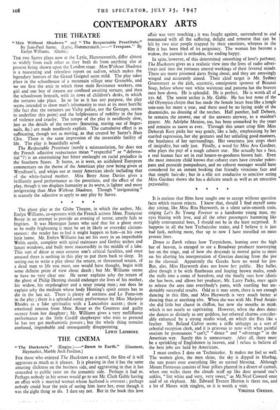CONTEMPORARY ARTS
THE THEATRE
" Men Without shadows " and " The Respectable Prostitute." By Jean-Paul Sartre. (Lyric, Hammersmith.)--" Trespass." By Emlyn Williams. (Globe.)
THE two Sartre plays now at the Lyric, Hammersmith, differ almost as widely from each other as they both do from anything else at present being shown upon the London stage. Men Without Shadows is a nauseating and relentless report on sadism, which makes the legendary horrors of the Grand Guignol seem mild. The play takes place in the schoolhouse of a mountain village near Grenoble, and we see first the attic in which three male Resistance workers, one girl and one boy of sixteen are confined awaiting torture, and then the schoolroom beneath, with its rows of children's desks, in which the tortures take place. In so far as it has any purpose, the play seems intended to show man's inhumanity to man at its most horrific (the fact that the torturers are Vichy police, not the Gestapo, seems to underline this point) and the helplessness of nobility in the face of violence and cruelty. The tempo of the play is needlessly slow, just as the details of the tortures (knouting, tearing out of finger- nails, &c.) are made needlessly explicit. The cumulative effect is as suffocating, though not as moving, as that created by Sartre's Huis Clos. There is the same impression of the inexorable futility of life. The play is beautifully acted.
The Respectable Prostitute (surely a mistranslation, for does not the French adjective respectueux mean " respectful " or " deferen- tial "?) is an entertaining but bitter onslaught on racial prejudice in the Southern States. It forms, as it were, an acidulated European commentary on the theme of the American play now being given at Wyndham's, and whips out at many American ideals including that of the white-haired mother. Miss Betty Anne Davies gives a brilliantly good performance as the prostitute, and the effect of the play, though it too displays humanity at its worst, is lighter and more invigorating than Men Without Shadows. Though " invigorating " is scarcely the adjective to apply to any play by Sartre. • The ghost play at the Globe Theatre, in which the author, Mr. Emlyn Williams, co-operates with the French actress Mme. Francoise Rosay in an attempt to provide an evening of terror, utterly fails to frighten. It was Montague James who said that for a ghost story to be really frightening it must be set in likely or everyday circum- stances : the reader has to feel it might happen to him—in his own little home. Mr. Emlyn Williams has set his story in an improbable Welsh castle, complete with spiral staircases and Gothic arches and lancet windows, and built most inaccessibly in the middle of a lake. This sort of decor at once arouses one's critical faculties, and once aroused there is nothing in this play to put them back to sleep. In setting out to write a play about the return, or threatened return, of a dead man to life you must, one would have thought, begin with some definite point of view about death ; but Mr. Williams seems to have no very clear one. He never explains why the return of the ghost of Philip Henting should endanger the lives of his mother, his widow, his stepdaughter and a stray young man ; nor does he explain why the medium whose body Henting's spirit enters has to die in the last act. There is plenty of eeriness and Le Fanu-ism in the play ; there is a splendid comic performance by Miss Marjorie Rhodes as a fake spiritualist with a Lancashire accent ; there is emotional tension from Mme. Rosay as the Countess and guilty secrecy from her daughter.; Mr. Williams gives a very mellifluous performance as the little 6.ardiff shopkeeper who tries to pretend he has not got mediumistic powers ; but the whole thing remains confused, improbable and consequently disappointing.
LEWIS LADBROXE.


































 Previous page
Previous page